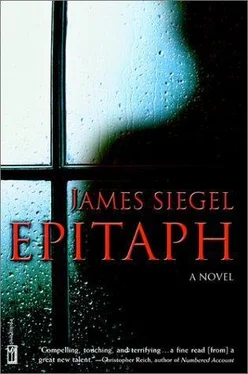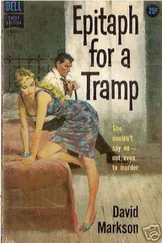James Siegel - Epitaph
Здесь есть возможность читать онлайн «James Siegel - Epitaph» весь текст электронной книги совершенно бесплатно (целиком полную версию без сокращений). В некоторых случаях можно слушать аудио, скачать через торрент в формате fb2 и присутствует краткое содержание. Жанр: Триллер, на английском языке. Описание произведения, (предисловие) а так же отзывы посетителей доступны на портале библиотеки ЛибКат.
- Название:Epitaph
- Автор:
- Жанр:
- Год:неизвестен
- ISBN:нет данных
- Рейтинг книги:4 / 5. Голосов: 1
-
Избранное:Добавить в избранное
- Отзывы:
-
Ваша оценка:
- 80
- 1
- 2
- 3
- 4
- 5
Epitaph: краткое содержание, описание и аннотация
Предлагаем к чтению аннотацию, описание, краткое содержание или предисловие (зависит от того, что написал сам автор книги «Epitaph»). Если вы не нашли необходимую информацию о книге — напишите в комментариях, мы постараемся отыскать её.
Epitaph — читать онлайн бесплатно полную книгу (весь текст) целиком
Ниже представлен текст книги, разбитый по страницам. Система сохранения места последней прочитанной страницы, позволяет с удобством читать онлайн бесплатно книгу «Epitaph», без необходимости каждый раз заново искать на чём Вы остановились. Поставьте закладку, и сможете в любой момент перейти на страницу, на которой закончили чтение.
Интервал:
Закладка:
"They were paid a commission, these recruiters, a percentage of the gross, a finder's fee. Like real estate…"
Jean, William whispered, oh Jean… oh…
"The perfect crime," Dr. Morten continued. "Because no one asked what happened to them-these Jews. The neighbors because they didn't care. The families because they did. Petoit had them write letters-ostensibly from Argentina, just to let everyone know they were fine. The recruiters would deliver them several weeks after each 'escape.' So no one asked questions, no one went hunting."
"Maybe the recruiters didn't know? Have you thought of that? Maybe they didn't know where Petoit was really sending them?"
"He knew." Dr. Morten said, somehow finding the heart to tell him after all. "The very first time Jean delivered a letter, he knew. The very first time he saw their belongings going nowhere, he knew. He was quite clear about that-he wanted to be sure I understood. He always knew."
Of course he knew. And William knew that he knew, knew it even before he'd asked Dr. Morten, knew it somehow all along. Jean had always known, and William had always known about Jean. Somewhere, he had.
But still…
"What about his guilt?" William said, trying to articulate a last best defense, trying to reach for something, anything, a piece of Jean that they might hold up to the light and call almost good. "He was a criminal. Okay, he was a candidate for Nuremberg maybe. One step below the Eichmanns of the world. But Eichmann never said I did it, Eichmann didn't own up. Jean did."
Dr. Morten shook his head, sighed, rubbed his temple, as if frustrated by his inability to get through to this severely impaired man sitting in front of him. Here he was spelling it out, in neon, and yet here was William still in the dark. "You still don't understand, do you. You don't understand everything."
Okay. I'm all ears now. I've taken my hands off, and my ears are wide open.
"Jean was picked up by the Germans several weeks before the fire started at Rue la Soeur. The charge-smuggling Jews. That was what was put on his record-the Germans were magnificent record keepers you know. But even they sometimes got things wrong. They were tipped off Jean was hustling Jews, so they snatched the 'Jew saver' off the street and threw him into prison. So that's what the record said-Jew smuggler. And that's what the relief agencies found a year later when they liberated Mauthausen. Jean, of course, never bothered to tell them differently."
"But what about his guilt?"
"It wasn't for them. Not for Gushenow or Leibowitz or Cohen or Samuelson or the eleven children of Chaim Mendelssohn or any of them. Jean didn't care about them-not when he was selling them a ticket on the Petoit Express and not after either. Jean only cared about his. Understand. You see Jean made a mistake. He never told his wife what he was up to-of course he didn't- but he did leave an address with her, a way to find him if he should ever not be there when she needed him. When he was picked up, he wasn't allowed to notify her. Of course no one was allowed to notify anyone when the Nazis picked you up. You just disappeared, and that was that. So there was poor Mrs. Goldblum waiting at home, without a word from Jean. Days went by, and still not a word from him. So finally, she did what Jean told her to do if he suddenly dropped off the face of the earth. She went to that address. To Dr. Petoit's house. For help. And Dr. Petoit gave it to her-the very same type of help he gave to everyone who came to his door in need. He gave it to her, and her two children. All this, of course, Jean found out later. But it wasn't hard. It was their bodies the firemen discovered in the furnace that day. Theirs. And Jean found out something else later too. All that time, they'd had him incarcerated in Gestapo headquarters just down the street. The day of the fire Jean could smell the burning. All day and all night he could smell it. And all day long a gray soot kept coming in through the window till it covered every inch of his cell. Everything-even him. Later when he learned just whose bodies were found, he understood. He understood that the soot that covered his cell that day was the bones of his family. Of his children. He never forgot the feel of it. He never forgot that smell."
William felt ill. He was ill. He needed to go back to the hospital and shoot himself full of morphine. He needed to go on vacation with Mr. Leonati and not come back. He needed to disappear. Where is William? they'd say, but William would be gone. He was almost gone already.
"Oh, he felt guilty. Sure. Guilty as sin. He'd made a dreadful mistake, hadn't he. He'd killed his wife and two children, murdered them, just as if he'd placed them in the furnace himself. That's why Mauthausen became like a penance for him. A penance for them. That's why he rejected a rescue he never expected and never thought he deserved."
So. There it was. Everything he'd hoped was remotely good about Jean wasn't. Everything he'd thought was horrible about him was worse. Thinking now of Jean on his knees to a woman in SS black, accepting a punishment that lasted fifty years. Only it was the wrong penance; he was answering for the wrong crime. Those numbers on his arm represented more than time served; they were the mark of Cain. There you go, Jean might have said to him, talking like a priest again.
"You wanted to know why Jean changed after the war. He didn't. He was what he was. A moral monster. Not quite the psychotic Petoit was. Jean couldn't have killed a dog at nine years old. He would've been the one holding it down. He couldn't murder someone on his own. But then, he didn't have to. He could send them on to someone who really enjoyed it."
William was beginning to feel something both strange and familiar. Yes, definitely. He understood now that horror sort of sneaks up on you and smacks you in the face. First you go ouch. Then you go numb. But when the numbness finally ebbs away, it leaves something behind. Like frostbite leaving those little splinters of pain. What was this pain? Well, it felt a little like betrayal, that's what it felt like. It had been ages since he'd felt that- sure, from time to time he'd felt the vestiges of it, an amputee feeling pain in a leg that's no longer there. And now that he felt it again, he remembered why he'd worked so hard to avoid ever feeling it again. He had, after all, done a bang-up job on that score. He'd retreated from all but the most superficial human contact and he'd bolted the doors behind him just to make sure. He'd made peace. Okay, so maybe it was like Geronimo's peace, the terms dictated by the victors as he was sent packing to a barren corner of the reservation. But then, then he'd come out for one last turn around the carousel-and even if his motives had not been altogether altruistic, even if he'd plunged ahead as much for his sake as for Jean's, there'd been one eyes-closed belief he'd taken with him. Like the simple Christian believes in two distinct forces- good and evil-he'd believed in two distinct Jeans, a prewar and postwar. And the postwar Jean was worth doing for, because the prewar Jean had earned it.
"I told you," Dr. Morten said. "I told you to forget about it and go home. You wouldn't listen. You wanted to know. So, now you know. Now you have to live with it."
William was about to agree, he was about to bow out, if not gracefully, at least quietly. He was about to go away and lick his wounds-after all, it seemed to be his season for wounds. But something stopped him. What stopped him was that he'd forgotten something. He was absolutely sure that he'd forgotten something. Forgotten, in fact, the only real reason he'd climbed out of bed to begin with.
And he remembered what Dr. Morten had said.
I thought about getting up and leaving him. About just refusing him as a patient.
Читать дальшеИнтервал:
Закладка:
Похожие книги на «Epitaph»
Представляем Вашему вниманию похожие книги на «Epitaph» списком для выбора. Мы отобрали схожую по названию и смыслу литературу в надежде предоставить читателям больше вариантов отыскать новые, интересные, ещё непрочитанные произведения.
Обсуждение, отзывы о книге «Epitaph» и просто собственные мнения читателей. Оставьте ваши комментарии, напишите, что Вы думаете о произведении, его смысле или главных героях. Укажите что конкретно понравилось, а что нет, и почему Вы так считаете.












